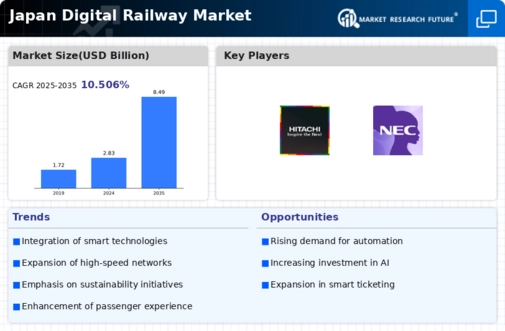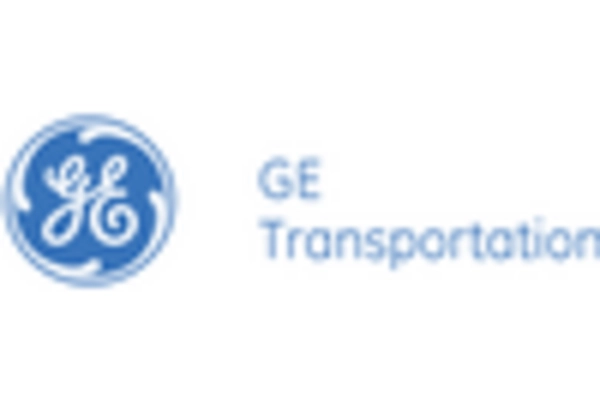Government Initiatives and Funding
The digital railway market in Japan is experiencing a boost. This boost is due to proactive government initiatives aimed at modernizing transportation infrastructure. The Japanese government has allocated substantial funding, estimated at ¥1 trillion, to enhance railway systems through digital technologies. This funding is directed towards the implementation of advanced signaling systems, real-time data analytics, and automated train operations. Such initiatives not only improve operational efficiency but also enhance safety and passenger experience. The government's commitment to digital transformation in the railway sector is expected to drive growth in the digital railway market, as it aligns with national goals of reducing carbon emissions and promoting sustainable transport solutions.
Urbanization and Population Growth
Japan's rapid urbanization and population growth are significant drivers of the digital railway market. As urban areas expand, the demand for efficient and reliable public transportation systems increases. The digital railway market is poised to benefit from this trend, as urban planners and railway operators seek to implement smart solutions that accommodate growing passenger volumes. With urban populations projected to rise by 10% over the next decade, the need for advanced digital infrastructure becomes paramount. This scenario presents opportunities for the digital railway market to innovate and expand, ensuring that transportation systems can effectively meet the needs of a burgeoning urban populace.
Focus on Safety and Security Enhancements
Safety and security are paramount concerns in the digital railway market in Japan. Recent incidents have heightened awareness regarding the need for robust safety measures. Consequently, railway operators are increasingly investing in digital technologies that enhance security protocols, such as surveillance systems and emergency response solutions. The integration of advanced monitoring systems can potentially reduce incidents by 25%, thereby fostering public confidence in railway travel. As safety remains a top priority, the digital railway market is likely to see continued investment in technologies that ensure the protection of passengers and infrastructure, ultimately contributing to the overall growth of the sector.
Technological Advancements in Railway Systems
Technological advancements play a crucial role in shaping the digital railway market in Japan. Innovations such as Internet of Things (IoT) devices, artificial intelligence (AI), and machine learning are being integrated into railway operations to optimize performance and safety. For instance, predictive maintenance powered by AI can reduce downtime and maintenance costs by up to 30%. Furthermore, the adoption of smart sensors and automated systems enhances operational efficiency and safety protocols. As these technologies continue to evolve, they are expected to drive further investment in the digital railway market, enabling operators to leverage data for better decision-making and service delivery.
Rising Demand for Enhanced Passenger Experience
In Japan, the digital railway market is significantly influenced by the increasing demand for improved passenger experiences. With a population that values efficiency and comfort, railway operators are investing in digital solutions that provide real-time information, seamless ticketing systems, and personalized services. The integration of mobile applications and digital displays in stations enhances communication and convenience for travelers. According to recent surveys, approximately 75% of passengers express a preference for digital services that streamline their travel experience. This growing expectation for enhanced services is likely to propel investments in the digital railway market, as operators strive to meet consumer demands and remain competitive.
















